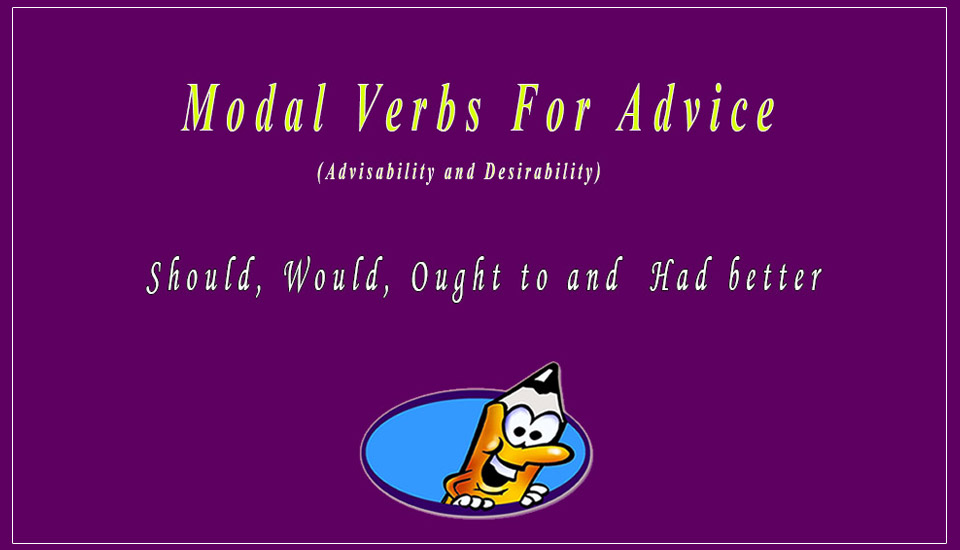
Modal verbs for advice (Advisability and Desirability)
Modal verbs are helping/auxiliary verbs that express ideas like ability, advice, and obligation. Many modal verbs have more than one meaning. They are always followed by the simple form of a verb. For example: Amanda should go to the doctor. This shows that we think it is a good idea for Amanda to visit the doctor. Modals for Advice
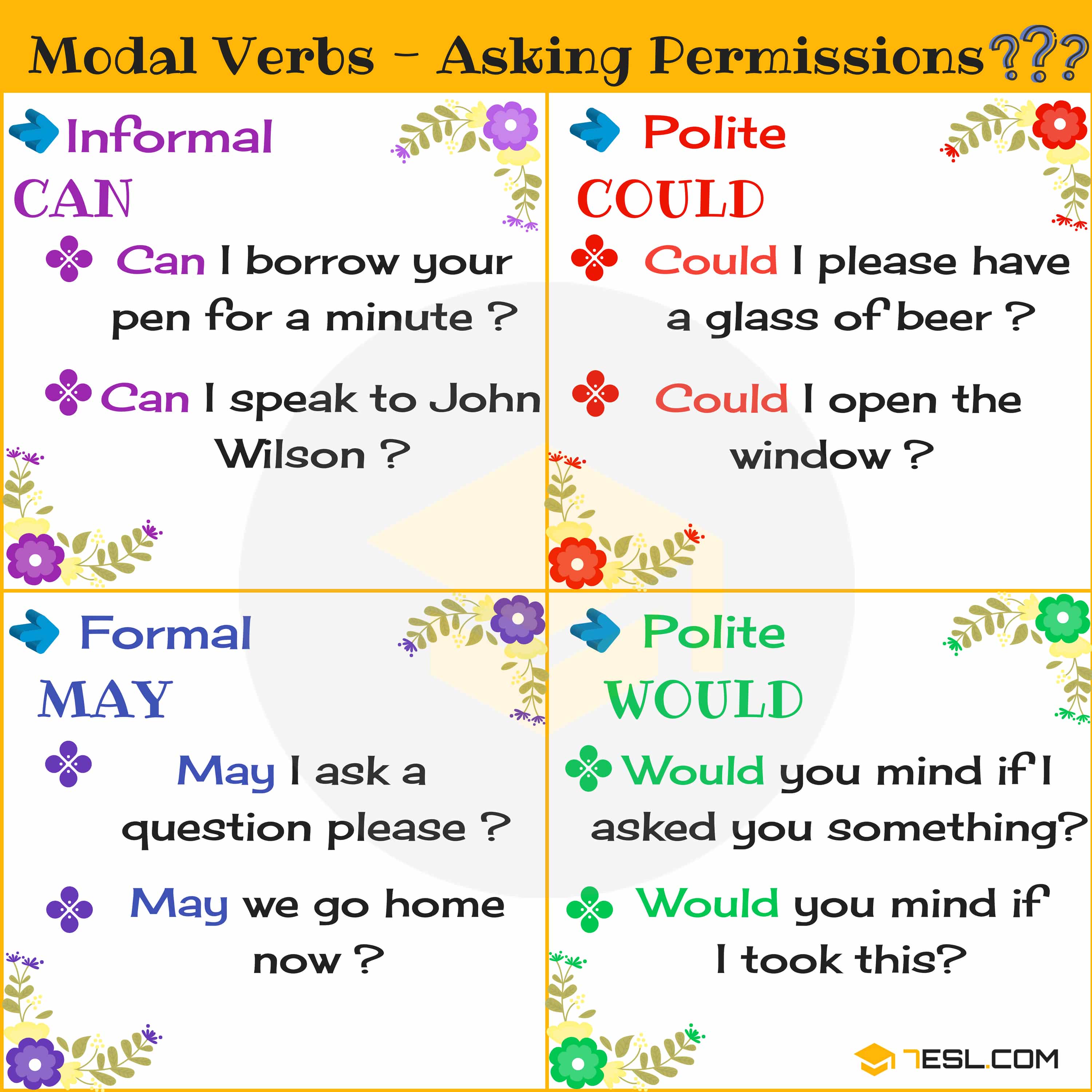
Modals for Asking Permissions Modal Verbs • 7ESL
Grammar explanation We often use verbs with modal meanings to talk about permission and obligation. Permission can We often use can to ask for and give permission. Can I sit here? You can use my car if you like. Can I make a suggestion? could We also use could to ask for permission (but not to give it). Could is more formal and polite than can.
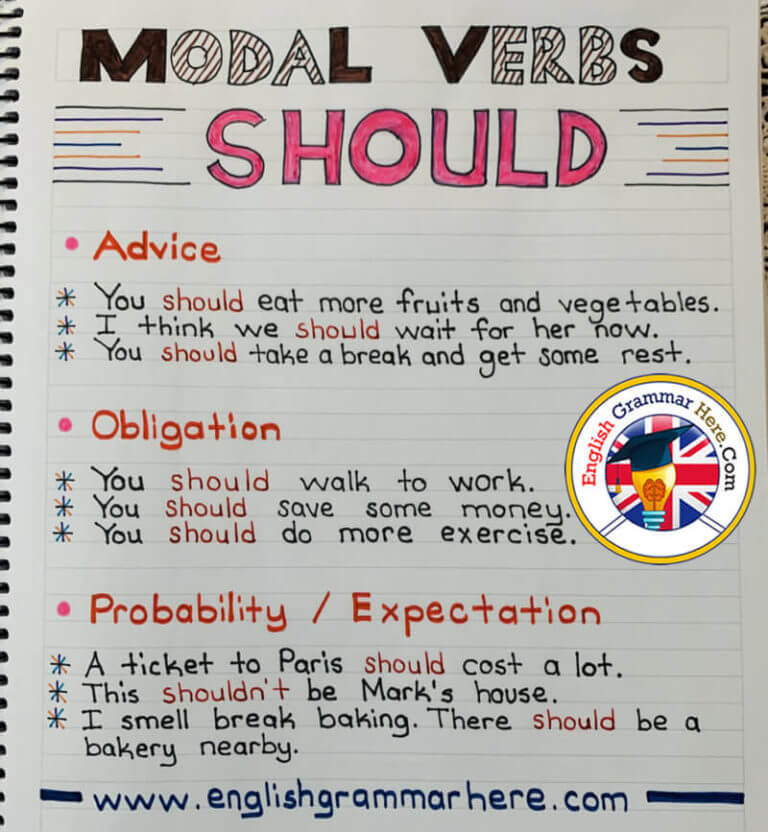
Modal Verbs Should, Example Sentences English Grammar Here
Obligation and Advice We can use verbs such as 'must' or 'should' to say when something is necessary or unnecessary, or to give advice. For example: Children must do their homework. We have to wear a uniform at work. You should stop smoking. Click here to find out more about obligation Permission

Modal verbs Atlantis Idiomas y Formación
Modal verbs to give order and advice. To express obligation in giving order and advice, we use these modal verbs : must. had better. should/ought to. could. The expression could be strong to less.

Modal Verbs of Advice My Lingua Academy
We use have to / must / should + infinitive to talk about obligation, things that are necessary to do, or to give advice about things that are a good idea to do. Mus t and have to are both used for obligation and are often quite similar. They are both followed by the infinitive. I must go now. / I have to go now. Are these exactly the same?

Modals Verbs, Types and Example Sentences English
Write with Grammarly What are modal verbs? Modal verbs show possibility, intent, ability, or necessity. Common examples of modal verbs include can, should, and must . Because they're a type of auxiliary verb (helper verb), they're used alongside the infinitive form of the main verb of a sentence.

Modal Verbs in English Teaching English Grammar, English Language
Modal verbs allow us to express ideas and opinions connected with possibility, certainty, necessity, ability, obligation or the willingness to do something. Common modal verbs include: can, should and must. For example, in 'I must go home' the modal verb 'must' shows obligation. Modals are a type of auxiliary (helping) verb.
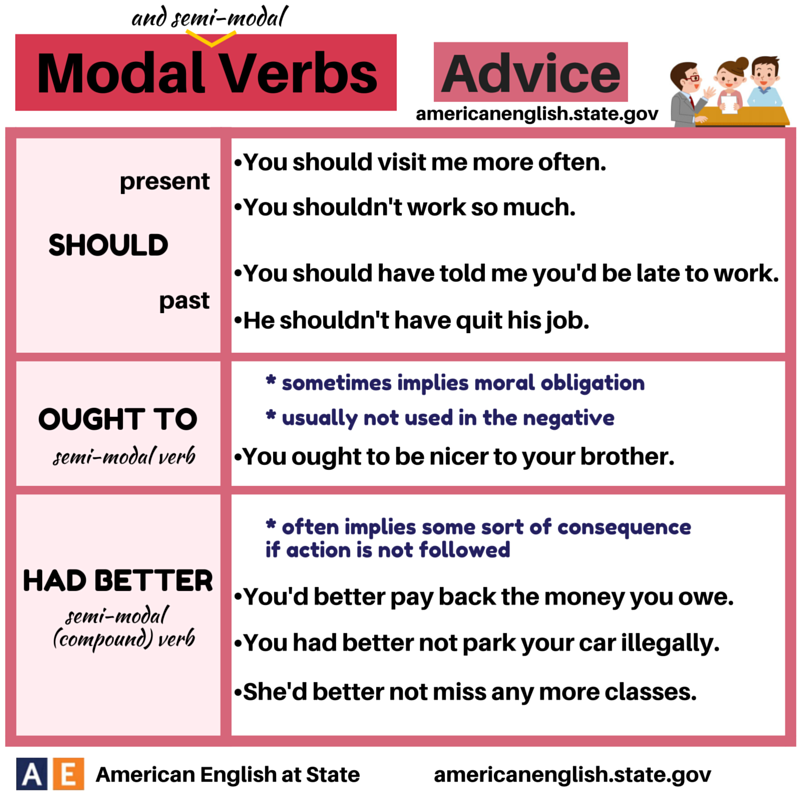
Handy Stuff for the English Classroom MODAL VERBS
Modal Verbs For Advice (Advisability and Desirability) We use modal verbs like should, would, ought to, and had better to give advice to someone. Should: Should is used for advice in the past, present or future. Past: Should' is the past tense of the word 'shall.'

Modal Verbs in English, How to Use Modals English Grammar Here
Modal verbs are verbs that express advice, capability, proposals, or hypothetical conditions. These verbs are different from normal verbs, such as tell, think, and reuse. This type of verb can be found before an action verb to give it an additional meaning. As auxiliary verbs, modal verbs cannot stand independently to complete a sentence.

Modal Verbs in English Usage & Examples ESL Forums
Modals of Advice. There are several modals we use to give advice to someone: should, ought to, and had better. Please note that even though had better looks like a past tense verb, in this case it is used in the simple present. We use the same formula: subject + modal + base form of the verb. You should study for the test .

English Grammar Modal Verbs ESLBuzz Learning English
Must is a modal verb and it has a present form, which can be used to talk about the present or the future. The negative form is must not or mustn't and the question is must I, must you, etc.. Should is used to give advice or an opinion about what we think is right or wrong.
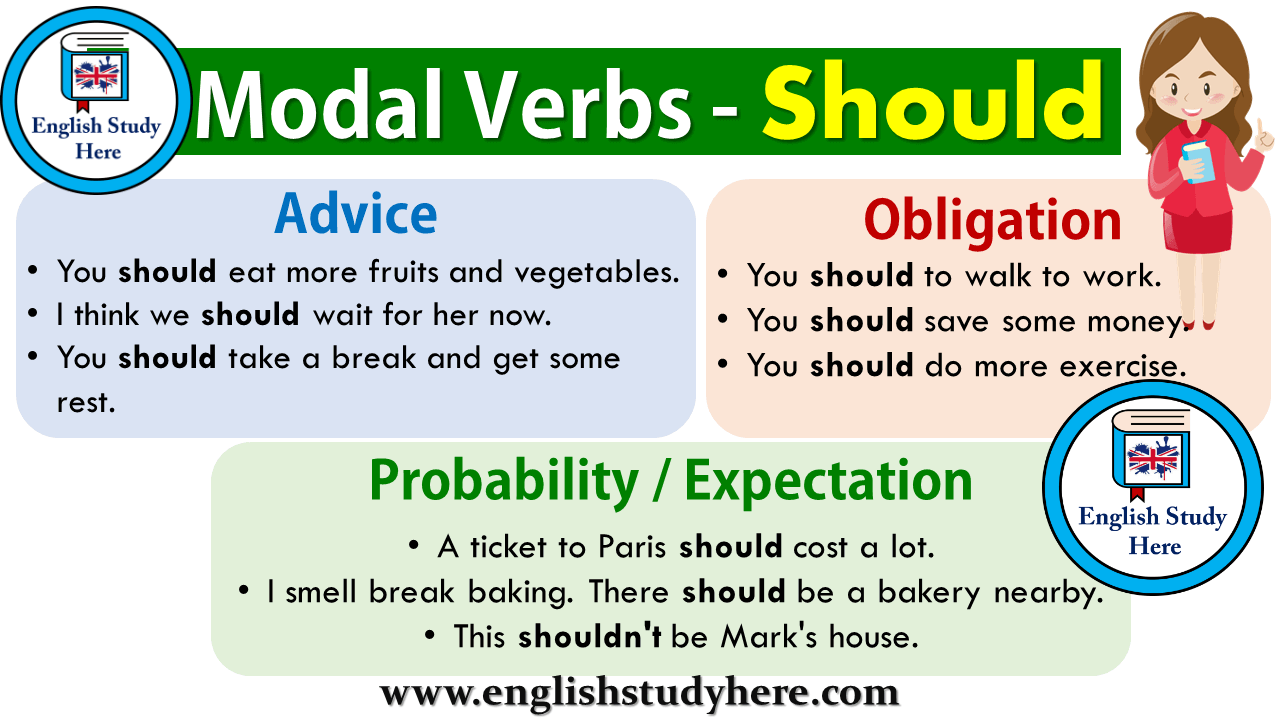
Modal Verbs Should English Study Here
The modal verbs in English grammar are can, could, may, might, must, need not, shall/will, should/ought to. They express ability, permission, possibility, obligation etc. Learn about the usage of modal verbs and their alternative forms in English grammar with Lingolia's online lesson. The put your knowledge to the test in the free interactive.

Modal Verbs and Example Sentences HAVE TO Unwillingness, forced
In this video, learn about the modal verbs of advice, should, ought to, had better and must. Learn how and when to use them with plenty of example sentences.
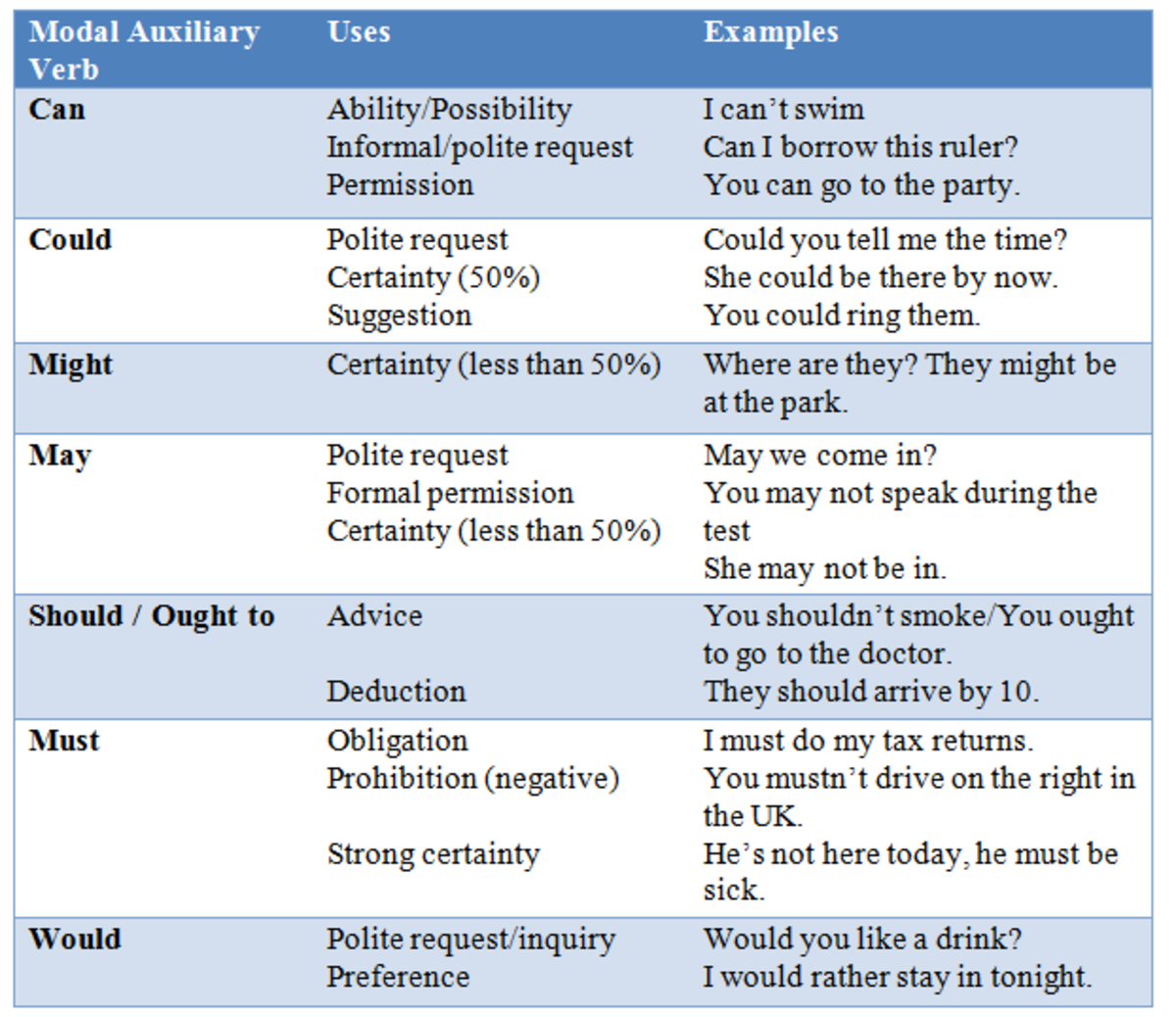
Modal Auxiliary Verbs Chart Worksheet Key Grammar My XXX Hot Girl
The modal verbs are: can may must shall will could might should would We use modals to show if we believe something is certain, possible or impossible: My keys must be in the car. It might rain tomorrow. That can't be Peter's coat. It's too small. We also use them to do things like talk about ability, ask permission, and make requests and offers:

Modal Verbs List and Using in English English Study Here
The modal verb "would" is used to give advice. In this situation, the speaker is giving hypothetical advice as if he/she were the listener. Here are some examples: If I were you, I would return the book. If I were you, I would not wear that jacket. It is not always necessary to include "If I were you". I wouldn't eat that.

Example Of Obligation Modals 10 Examples Of Modals Definition And
Free English Course Copyright © 2024 The modal verbs for advice exercise asks you to choose the correct modal verb depending on the advice. The modals used are should and would.